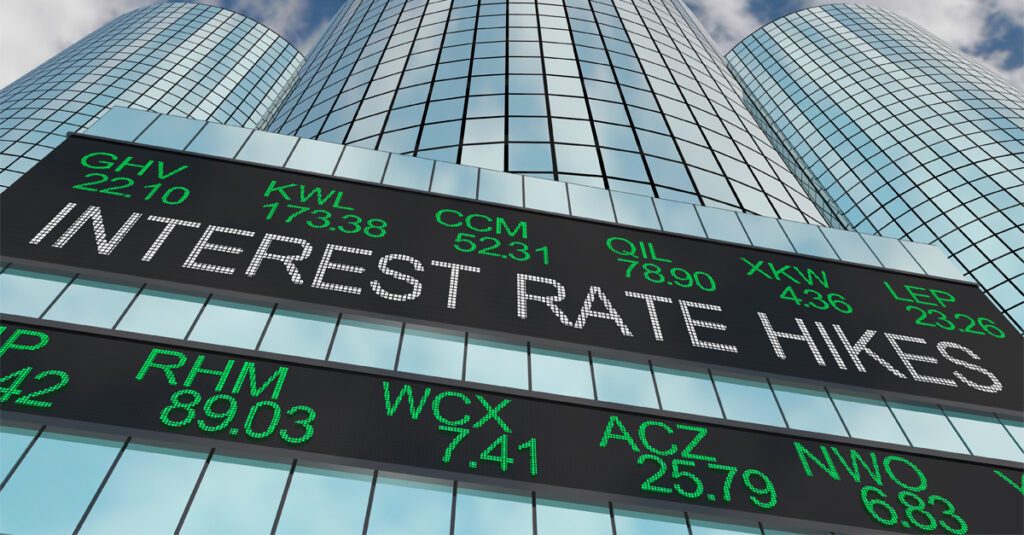Interest Hikes – What YOU Need to Know!
We all Knew it Was on The Cards – Last Week The Big Bad Bank of England Raised Interest Rates From 1.25% to 1.75%
The biggest indication yet that, if we think things are hard now, we are headed for a rude awakening, is that the rate will be increased by 0.5%, something that hasn’t been done in 27 years.
Why add additional suffering when we are all already having trouble making ends meet?
The Bank of England is attempting valiantly to lower the cost of living.
But after flooding the UK economy with cash when the sub-prime crisis threatened to collapse the global economy in 2008, cutting interest rates to 0.5% in 2009 from 5.75% where they were in 2007, and then giving out additional hundreds of billions of pounds to get us through the pandemic, it has run out of ammunition.
The Bank of England’s only remaining tool to prevent inflation from spiralling out of control is interest rates.
Higher interest rates make borrowing more costly, so we borrow less, prices drop because we have less money to spend, and then, all of a sudden, everything is back on track.
At least, that is the hope.
The issue is that we’re very close to it simply failing.
The cost of everything has already increased to the point that Brits must borrow money merely to cover necessities like food and heating.
Even with higher rates, the Bank has still admitted inflation is now likely to hit 13% in months and is going to stay ‘very elevated’ next year – code for, ‘This is going to take another two years before things feel remotely better.’
Don’t Delay The Pain
This week, central bank officials in 190 different nations received a thrashing and orders to continue raising interest rates despite the pain.
Governments were instructed not to decrease taxes, although limited targeted aid for the most vulnerable was permitted.
If we don’t deal with the inflation monster today, things will become much, much worse. The International Monetary Fund, where the Bank of England and its international equivalents must go cap in hand if they lose control of the home economy, makes no bones about this.
Higher, higher, higher
Instead of the 11% originally forecasted, the Bank of England has updated its inflation projection upward, stating that during the last three months of this year, price increases in Britain would reach 13%, with the bulk of the increase attributable to anticipated increased home energy costs.
By October, analysts at Cornwall Insights predict that yearly energy costs would reach an average of £3,300.
On that front, Vladimir Putin, the president of Russia, is in charge.
Energy is being restricted by his war in Ukraine, and until the conflict is done, nothing will change. We believe.
House Prices
Despite years of absurdly high housing price inflation, the average price of a home fell 0.1 percent in July.
Since June of last year, the first monthly decrease has occurred; some believe this to be a precursor to a slowdown.
People may borrow less money when mortgages are more costly, and sellers will start to accept lesser bids as a result.
At least that’s the case where there are plenty of homes on the market…
Mortgage shock
Rates on mortgages are rising.
Expect a walloping increase in your monthly payments if you got a two-year fixed rate in 2020 when they were absurdly cheap.
It will add around £338 to your monthly mortgage payment if you have a £400,000 mortgage.
Borrowers whose five-year fixes are about to expire will also experience a payment shock.
For at least the next six months, everybody who isn’t on a fixed rate plan will watch their payments go up, up, and up. There are two million of us in this situation.
‘We have a mortgage interest rate ticking time bomb scenario,’ says Adrian Anderson of mortgage broker Anderson Harris.
Too Right We Have
Savvy Savers
If you’ve got money tucked away in savings, you will earn slightly more interest.
That’s good, right? Not exactly. With inflation at 13%, cash earning 1.7% is plummeting at a real rate of 11.3%.
Please Sir, Can I Have Some More?
The Bank of England is becoming more and more concerned that, in the face of rapidly rising inflation, we will all start demanding significant salary increases.
The governor of the Bank, Andrew Bailey, encouraged salary restraint earlier this year during the yearly negotiation process between employees and employers, urging people to think about the “social question” and cautioning against a “wage-price spiral,” which is harmful.
He is accurate, according to the economics textbook.
You may think that’s a little excessive coming from someone who makes £575,000 a year, but he did turn down a raise for himself for the third year running.
Chaos Everywhere
The Bank of England has now acknowledged that we are entering a recession and will be really sinking by November after promising us all for months that things weren’t quite that terrible.
Can’t Pay – Won’t Pay
Following the watchdog Ofgem’s announcement that the dreaded energy cap review will henceforth occur four times per year rather than twice, we are now dealing with even more problems with our energy bills.
Even with the government’s £400 discount, it’s still quite insulting that energy firms are generating billion-dollar profits.
A recent social media movement called Don’t Pay UK asks us all to hold off on paying our bills until businesses reduce their prices.
Sounds alluring, but in the end, your bills will probably increase much more!
All opinions and views expressed or suggested by the Digital Zeitgeist are not necessarily the same opinions and views held by or suggested by GPM-Invest plus any and all partners, affiliates, parties, or third parties of GPM-Invest. Any type of media distributed by GPM-Invest IS NOT financial advice. Please seek advice from a professional financial advisor

